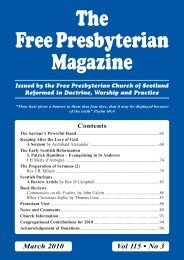December - the Free Presbyterian church of Scotland
December - the Free Presbyterian church of Scotland
December - the Free Presbyterian church of Scotland
- No tags were found...
You also want an ePaper? Increase the reach of your titles
YUMPU automatically turns print PDFs into web optimized ePapers that Google loves.
364The <strong>Free</strong> <strong>Presbyterian</strong> Magazineits position as a state Church. The Confession was adopted by <strong>the</strong> first parliament<strong>of</strong> <strong>the</strong> infant James VI in 1567 as <strong>the</strong> Confession <strong>of</strong> Faith pr<strong>of</strong>essedand believed by <strong>the</strong> Protestants within <strong>the</strong> realm <strong>of</strong> <strong>Scotland</strong>, published by<strong>the</strong>m in <strong>Scotland</strong>, and by <strong>the</strong> Estates “authorised as a doctrine groundedupon <strong>the</strong> infallible Word <strong>of</strong> God”. 6Pr<strong>of</strong>essor Lyall points out that what we have here “is <strong>the</strong> Confession publishedby <strong>the</strong> Protestants <strong>of</strong> <strong>Scotland</strong> and ratified and approved by Parliament.The civil authority does not act, it approves a statement formulated outside<strong>of</strong> itself. Again, it is not <strong>the</strong> Confession <strong>of</strong> <strong>the</strong> Church <strong>of</strong> <strong>Scotland</strong> at this stage.Nor is it adopted or put forward by authority <strong>of</strong> that Church. It is <strong>the</strong> Confession<strong>of</strong> <strong>the</strong> Protestants in <strong>Scotland</strong>, and no institutional <strong>church</strong> is referred to.” 7Though The Scots Confession was replaced in 1644 by <strong>the</strong> fuller and morecarefully-systematic document, The Westminster Confession, it was notablefor its freshness and directness and, as becomes a confession <strong>of</strong> faith, it appearsto come from <strong>the</strong> heart. Among its 25 articles, <strong>the</strong> section on good works is<strong>of</strong> particular relevance to <strong>the</strong> setting up <strong>of</strong> <strong>Presbyterian</strong>ism in <strong>Scotland</strong>. ThereKnox and his colleagues inveigh against any idea <strong>of</strong> merit or supererogatoryvirtue. Good works are those done in faith and in obedience to God’s commandments,but <strong>the</strong>y are not done by man’s free will. “The Spirit <strong>of</strong> <strong>the</strong> LordJesus dwelling in us by faith brings forth good works.”Having in view <strong>the</strong> gross errors <strong>of</strong> <strong>the</strong> Roman Church, this section goes onto state that, not only are contraventions <strong>of</strong> <strong>the</strong> moral law evil, but so also arethose “that in matters <strong>of</strong> religion and worshipping <strong>of</strong> God have no assurancebut <strong>the</strong> invention and opinion <strong>of</strong> man, which God from <strong>the</strong> beginning has everrejected”. This was in accord with <strong>the</strong> view <strong>of</strong> Calvin that, in <strong>the</strong> worship <strong>of</strong>God, nothing was permissible which did not have express Scripture warrant.Calvin states, “The whole sum <strong>of</strong> righteousness, and all <strong>the</strong> parts <strong>of</strong> divineworship, and everything necessary to salvation, <strong>the</strong> Lord has faithfully comprehended,and clearly unfolded, in His sacred oracles so that in <strong>the</strong>m Healone is <strong>the</strong> only Master to be heard”. 8 We have here, in o<strong>the</strong>r words, a plainstatement <strong>of</strong> <strong>the</strong> Regulative Principle. This insistence on drawing guidancefrom Scripture alone would have its application in <strong>Scotland</strong> in <strong>the</strong> form <strong>of</strong>Church government and <strong>the</strong> establishment <strong>of</strong> <strong>Presbyterian</strong>ism.Burleigh highlights ano<strong>the</strong>r relevant and important statement <strong>of</strong> The ScotsConfession concerning <strong>the</strong> nature <strong>of</strong> <strong>the</strong> true Church <strong>of</strong> God: “Where <strong>the</strong>reis true preaching <strong>of</strong> <strong>the</strong> Word <strong>of</strong> God, right administration <strong>of</strong> <strong>the</strong> sacraments<strong>of</strong> Christ Jesus, ‘which must be annexed to <strong>the</strong> Word and promise <strong>of</strong> God,6 G D Henderson (ed), The Scots Confession <strong>of</strong> 1560, Saint Andrews Press, 1960, p 3.7 Francis Lyall, Of Presbyters and Kings, Aberdeen University Press, 1980, p 13.8 Institutes <strong>of</strong> <strong>the</strong> Christian Religion, Beveridge translation, Eerdmans 1957 reprint, vol 2, p 436.
















